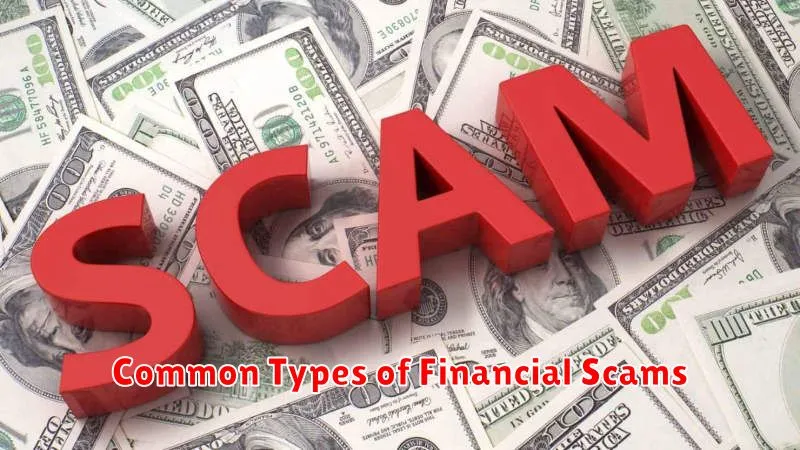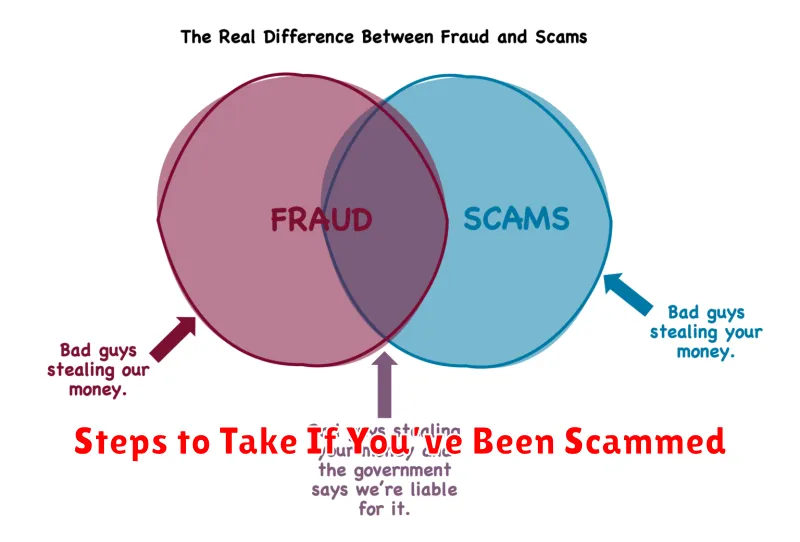In today’s digital age, the financial world is more accessible than ever before. However, with this increased accessibility comes a heightened risk of scams and fraud. It’s crucial to stay informed and protect yourself from malicious actors seeking to exploit your hard-earned money.
This article will equip you with the knowledge and tools to navigate the financial world safely. We’ll delve into common scams, identify red flags to watch out for, and provide practical tips to safeguard your finances and personal information. Whether you’re a seasoned investor or new to managing your money, understanding how to identify and avoid financial fraud is paramount.
Common Types of Financial Scams

In today’s financial landscape, various scams target individuals and businesses alike. Understanding these scams is crucial for safeguarding your financial well-being. Below are some of the most common types of financial scams you might encounter.
One prevalent type is the Phishing Scam, where scammers impersonate legitimate institutions via emails or messages to steal personal information. Always verify the source before providing any sensitive details.
Another common scam is the Ponzi Scheme. In this fraudulent investment operation, returns are paid to earlier investors using the capital contributed by new investors, rather than from profit earned by the operation of a legitimate business.
The Advance Fee Fraud is also widespread; it involves a scam where an individual is promised a significant sum of money in return for an upfront fee that is never fulfilled. This scam exploits the victim’s greed and is often disguised as a lottery win or inheritance.
Lastly, the Romance Scam takes advantage of individuals seeking companionship. Scammers build fake relationships online and eventually ask for financial assistance under false pretenses. Always be cautious when engaging in online romances.
By familiarizing yourself with these common financial scams, you can enhance your defenses and protect your hard-earned money. Stay informed and vigilant to navigate the financial world safely.
How to Spot a Scam Before It’s Too Late
In today’s digital age, financial scams are more sophisticated than ever. Protecting yourself requires vigilance and a keen eye for red flags. Here’s how to spot a scam before it’s too late:
1. Unrealistic Promises: If it sounds too good to be true, it probably is. Be wary of guarantees of high returns with little or no risk.
2. Pressure Tactics: Scammers often create a sense of urgency to pressure you into making a quick decision. Don’t fall for it. Take your time and do your research.
3. Unsolicited Contact: Be cautious of unsolicited emails, phone calls, or messages, especially if they ask for personal or financial information. Legitimate companies rarely initiate contact in this way.
4. Suspicious Links or Attachments: Never click on links or open attachments from unknown or suspicious sources. They could infect your device with malware or lead you to fake websites designed to steal your information.
5. Unfamiliar Websites: Before entering any personal or financial information online, double-check the website address. Look for secure connections (https://) and be wary of websites that look unprofessional or poorly made.
6. Request for Upfront Payment: Be extremely cautious of any investment opportunity that requires you to pay a fee or make a deposit before you can access your funds or receive promised returns.
By being aware of these common scam tactics and following these tips, you can significantly reduce your risk of becoming a victim of financial fraud.
The Role of Technology in Modern Financial Fraud
Technology, while revolutionizing financial services and empowering consumers, has also created new avenues for fraudsters to exploit. The internet, mobile devices, and digital payment systems have significantly expanded the attack surface, allowing criminals to operate across borders and target victims with increasing sophistication.
Phishing attacks, often carried out through emails and fake websites, trick individuals into revealing sensitive information like login credentials and credit card details. Social engineering techniques prey on human vulnerabilities, manipulating individuals into authorizing fraudulent transactions or disclosing personal information.
Advancements in technology have also led to the rise of more complex schemes. Malware, including viruses and Trojans, can infect devices and steal data, while ransomware can lock users out of their accounts until a ransom is paid. Cryptocurrencies, with their decentralized and often anonymous nature, have become a tool for money laundering and other illicit activities.
Fraudsters are constantly adapting their tactics, leveraging new technologies like Artificial Intelligence (AI) to create more convincing scams and bypass security measures. Understanding the role of technology in modern financial fraud is crucial for individuals and businesses to protect themselves effectively.
Steps to Take If You’ve Been Scammed

Discovering you’ve been a victim of financial fraud can be incredibly stressful. Acting quickly is crucial to mitigate the damage. Here’s what to do:
1. Report the scam to the appropriate authorities. This could include your local police department, the Federal Trade Commission (FTC) at https://report.ftc.gov/ , or the Internet Crime Complaint Center (IC3) if the scam originated online at https://complaint.ic3.gov/. Provide them with as much detail as possible about the scam, including any communication, transactions, and individuals involved.
2. Contact your financial institution if you’ve shared bank account information, credit card details, or any other sensitive financial data. They can help you monitor your accounts for suspicious activity, potentially reverse fraudulent transactions, and take steps to protect your accounts going forward.
3. Change your passwords for any online accounts that might have been compromised, especially if you used similar or identical passwords across multiple platforms. Consider using a password manager to generate strong, unique passwords for each account.
4. Monitor your credit reports regularly for any suspicious activity. You can request free credit reports from the three major credit bureaus (Equifax, Experian, and TransUnion) at https://www.annualcreditreport.com/. If you notice any inaccuracies or fraudulent accounts, report them immediately to the credit bureaus.
5. Be wary of further contact from scammers. They may try to contact you posing as law enforcement or other officials in an attempt to extract more information or money from you. Remember, legitimate authorities will never ask for sensitive information over the phone or through email.
By taking these steps, you can minimize the potential damage from the scam and start the process of recovering your financial security.
How to Protect Your Personal Information Online
Protecting your personal information online is crucial in today’s digital age, especially when it comes to financial matters. Here are some key steps you can take to safeguard your data:
Create Strong Passwords: Use a combination of upper and lowercase letters, numbers, and symbols. Aim for at least 12 characters. Don’t reuse passwords across multiple accounts.
Be Cautious of Phishing: Beware of suspicious emails, texts, or phone calls asking for personal or financial information. Legitimate institutions will never ask for this information through unsecured channels.
Secure Your Devices: Enable strong passwords or biometrics on your devices. Keep your operating system, web browsers, and security software up to date.
Limit Information Sharing: Be mindful of the information you share online, especially on social media. Avoid publicly posting details like your full birthdate, address, or phone number.
Review Privacy Settings: Regularly review and adjust privacy settings on your social media accounts and other online platforms. Limit the information accessible to the public.
Secure Wi-Fi Networks: Use strong passwords for your home Wi-Fi network. Avoid using public Wi-Fi for financial transactions, as these networks can be insecure.
Monitor Account Activity: Regularly review your bank and credit card statements for any suspicious activity. Report any unauthorized transactions immediately.
The Importance of Educating Yourself on Financial Scams
In today’s world, financial scams are becoming increasingly common. Scammers are always coming up with new and sophisticated ways to steal your money, so it’s more important than ever to be aware of the risks.
By educating yourself on common scams, you can learn how to identify and avoid them. This includes understanding the different types of scams, the tactics that scammers use, and the warning signs to look out for.
When you take the time to learn about financial scams, you’re not just protecting yourself. You’re also helping to protect your loved ones, who may be more vulnerable to these types of crimes.
Remember, knowledge is power. The more you know about financial scams, the better equipped you’ll be to protect yourself and your finances.
Resources for Reporting and Recovering from Financial Fraud
Falling victim to financial fraud can be a devastating experience. If you believe you’ve been scammed, it’s crucial to act swiftly and report the incident to the appropriate authorities. Here are some key resources that can assist you in reporting the fraud and potentially recovering your losses:
1. Law Enforcement: Contact your local police department or sheriff’s office to file a report. Provide them with all relevant details of the scam, including names, dates, amounts, and any communication records.
2. Federal Trade Commission (FTC): The FTC is a consumer protection agency where you can report fraud online at https://reportfraud.ftc.gov/#/ or by calling 1-877-FTC-HELP (1-877-382-4357).
3. Financial Institutions: If the fraud involved your bank account or credit card, report it to your financial institution immediately. They have dedicated fraud departments to assist you with account security and potential reimbursement.
4. Credit Reporting Agencies: Contact the major credit bureaus (Equifax, Experian, and TransUnion) to report the fraud and consider placing a fraud alert or credit freeze on your credit reports to prevent further unauthorized activity.
5. Other Resources: Depending on the nature of the scam, other organizations that may be able to provide assistance include:
- The Internet Crime Complaint Center (IC3) for internet-related scams
- The U.S. Postal Inspection Service for mail fraud
- State securities regulators for investment scams
- The National Elder Fraud Hotline at 1-833-FRAUD-11 (1-833-372-8311) for scams targeting seniors
Remember to keep detailed records of all communications, transactions, and reports filed. Recovering from financial fraud can take time and persistence, but by taking these steps, you are moving in the right direction to mitigate the damage and seek justice.

